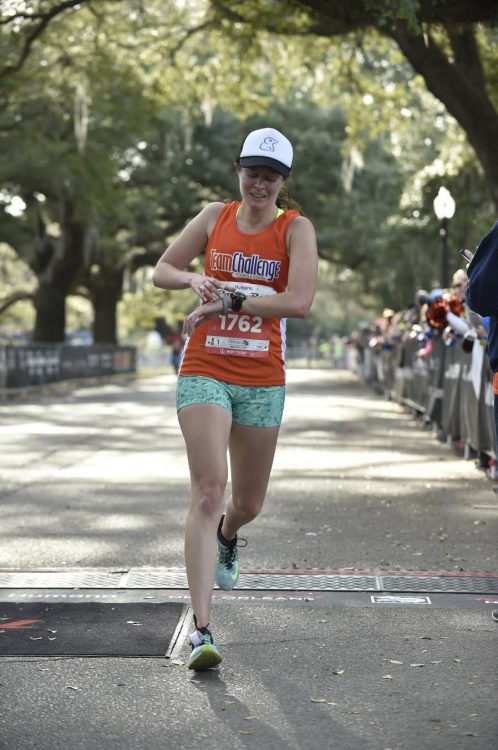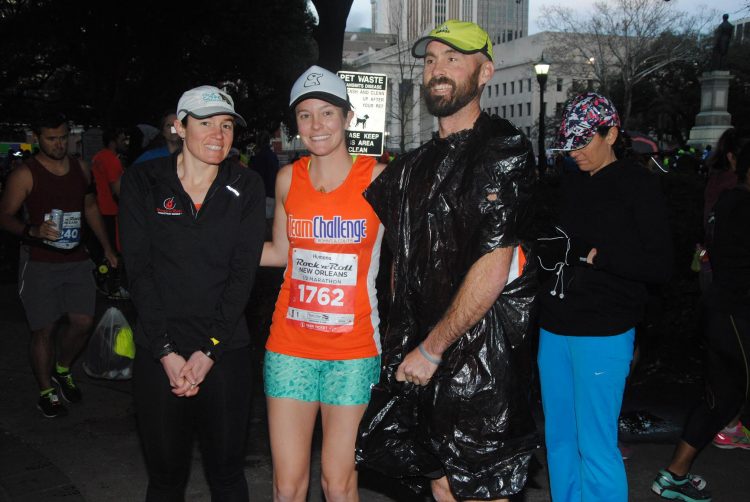I have to admit – when the Crohn’s & Colitis Foundation asked if I wanted to speak at this year’s Team Challenge inspirational party the night before a major goal race of mine, my first thought was: What if I have to poop in the middle of my speech? At least I was in a room full of people who could probably point me in the right direction.
I was diagnosed with ulcerative colitis when I was 14 years old. It happened like it does for so many of us. So much diarrhea and blood, cramps, exhaustion – the list goes on. I don’t remember the exact sequence of events, but my mom says when my pediatrician heard the severity of what was going on, she walked over to the gastroenterologist and urged him to see me as soon as possible. One sigmoidoscopy and colonoscopy later, the verdict was in: I had ulcerative colitis.
We were able to get it under control almost immediately, so I was fortunate to have a pretty normal high school life. I ran cross country and track, I went to the bathroom a regular amount and really no one knew I had inflammatory bowel disease. I graduated as a four-year varsity athlete with a handful of cross-country course records, one state meet berth, healthy as an ox and ready to tackle the next adventure: college.
In 2005, I moved into the dorms at UC Santa Barbara, and like any good student, I had a total blast my first year. I felt great – so great, in fact, that I started to skip my medication. Since I experienced zero symptoms in high school and didn’t understand anything beyond just having to take some random pills, I thought, What the hell? Yeah – big oops.
Summer 2006 came way too fast, and I started experiencing some familiar symptoms – diarrhea, cramping, fatigue and blood. Within a matter of days, I was in bed, then in bed some more, then not eating, then going to the bathroom more than 40 times a day, then trying not to vomit and poop at the same time, then watching reruns of CSI Las Vegas. (My mom still jokes to this day that Gil Grissom saved my life that summer.) I was in my very first post-diagnosis flare. I was 19 years old and learned quickly that this disease is not a joke. It’s here to stay, and I need to listen.
I tried a few different things to get better as I struggled through the summer and headed back to school, including the dreaded steroid route for close to a year. There were times when I felt like I would literally never eat anything again other than Saltines and Ensure. There were times when my parents probably thought the same thing. For those of you who have been there, I totally get it. The helplessness, the fear, the anger, the confusion. That was me at 19, at a low weight and waking up just to roll over and go back to sleep.
After two quarters back at UCSB and dealing with a flaring gut and the emotional toll of accidents in public places mixed with peers who weren’t understanding of what was happening to me, I made the choice to skip my last quarter that year to get better at home.
During this time, I obviously was not running. I was barely going outside. The first time I did leave the house before heading back to school, my boyfriend at the time drove me to the beach. As we slowly moved down the ramp toward the bathrooms, I told myself, Just make it to the water and back. This goal meant being more than a few steps from a toilet, something I hadn’t done all summer. I was petrified. I remember feeling the cool, fresh air on my face and shuffling my fragile frame with his assistance. I was so freaking winded – it feels ridiculous looking back now! – but I remember I was determined to get my feet wet. I don’t recall how long we stood down there or how long I spent in the bathrooms afterward, but I still remember that fresh air…that same fresh air I feel when I go for my daily run today.
I like to say that Team Challenge, the endurance training and fundraising program for Crohn’s and ulcerative colitis research, saved my runner life – but really it saved my whole life. By September 2007, we had found a treatment that worked for me, and I’m grateful that it’s still working for me 10 years later. I found out about the program at a foundation symposium when I was desperate for answers about my own body. They were participating in their first national event– the wine country half in Napa in July 2008. I was still in college, and I had never run a half marathon before. I trained remotely and met up with the rest of the San Diego team on race weekend. I was immediately adopted by a group of girls who still remain some of my closest friends today. And let me add that I had just turned 21 a few months earlier, so having your first Team Challenge event in wine country wasn’t so bad!
There’s nothing quite like completing your very first race – especially if you’re wearing those honored heroes on your back and that orange Team Challenge logo on the front. From the second I crossed that first finish line in Napa to now, I knew one of my purposes in life would be to show people that you can thrive – not just survive, but thrive – with this disease.
For me, that means exploring what running means to me as an adult with UC. For me, that meant going back to school for a summer session to graduate on time with my friends.
For me, that meant training to qualify for the Boston Marathon at my marathon and accepting my symptoms not as setbacks, but as reasons to keep moving forward. I qualified in 2015, and crossing that finish line in Boston last April meant that no dreams are too big and no steps are too small to get there.
For me, as I crossed the finish line of my seventh race with Team Challenge last month, that meant respecting my body’s limits but not being afraid to test them. I ran for a personal best, and I achieved it by three minutes!
Wherever you are with your own inflammatory bowel disease, you are so not alone in your steps toward your goals, and we all know remission does not equal cured. Just getting out of bed is still a step some days, while other days it might be walking to the end of the driveway and back. That’s how I started anyway. These seemingly small things are steps toward your tomorrow – a day that, 10 years ago, I learned always comes.
My story is my story, but it’s also the story of so many I know who are also fighting the fight against their own body.
It’s the story of the son who’s been battling Crohn’s since he was a kid and is now an active advocate for the cause at just 14 years old.
It’s the story of my big bro’s wife who has been in and out of the hospital and still can’t wait to get back on her bike. (She makes us all look bad!)
It’s the story of the daughter who can’t attend family trips because she’s too sick, so her mom comes out to walk in honor of her.
It’s the story of two guys, one diagnosed years ago and one recently, who still came out to talk IBD nerdy with me on our training runs.
It’s the story of the daughter who has literally made it her job to end this thing, working full-time for the foundation, sometimes from her hospital bed, and this year I was so lucky to call her mom my teammate.
I ran for many as I covered the 13.1-mile journey at Rock ‘n’ Roll New Orleans, but the one at the top of the list is myself – to celebrate that moment two months ago, following a colonoscopy, when my gastroenterologist said, “Everything came back clear.”
Every time I choose to throw the middle finger at IBD, I hope one more person with inflammatory bowel disease thinks, Yes, it is possible.
Because yes, it is always possible.
We want to hear your story. Become a Mighty contributor here.



